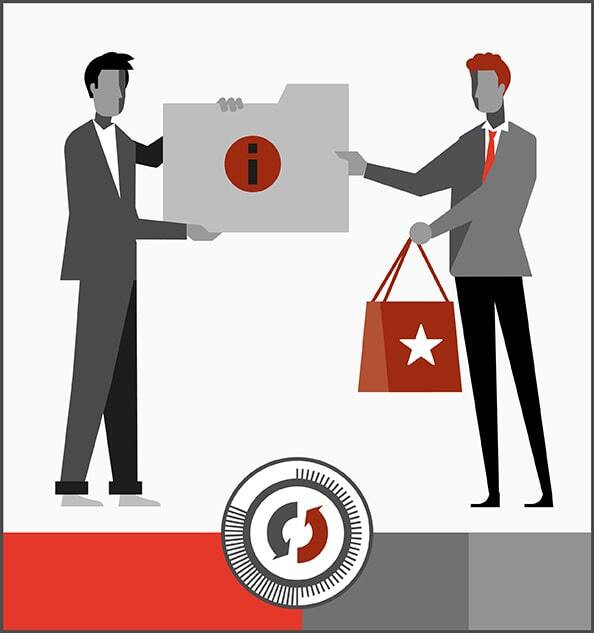- Only 33 percent of Europeans trust companies to handle their digital data properly; in the USA as few as one in four consumers
- Banks and online payment providers enjoy the greatest degree of trust, while telecommunications companies, online retailers, social networks and messaging services rank lower on the trust scale
Hamburg, October 6, 2020 – The responsible handling of the valuable commodity “digital data” has become more important than ever. Because data like this helps companies to better understand their customers and their preferences and to respond to market trends. However, the willingness of consumers to disclose their data is crucially dependent on trust. In this respect, companies have not fared particularly well until now, with only 33 percent of Europeans trusting companies to handle their digital data. US citizens are even more distrustful (23 percent), while Russians are somewhat less skeptical (41 percent). These are some of the findings from a recent representative survey entitled “What’s the value of data?” conducted by financial services provider and investor EOS in 17 countries. The reasons for this skepticism result in part from bad experiences with disclosing data. Every fourth or fifth consumer has at some point had a negative experience online in this regard.
Significant differences in level of trust depending on sector and type of data
There are clear differences between sectors: Banks and financial services providers enjoy the greatest level of trust for their handling of customer data (Europe: 54 percent, USA: 56 percent, Russia: 54 percent), although not unconditionally across all countries. Energy utilities and insurance companies also come off relatively well (average value across all countries 39 percent). However, there is a lack of trust when it comes to telecommunications companies (28 percent on average), online retailers (21 percent on average) and social networks and messaging services (14 percent on average). That people still provide their data to the latter (contact information, movement data, purchasing and surfing behavior) can be explained by the fact that users regard this data as less sensitive. Universally, financial details are regarded as being the most worthy of protection.
 Стефан Боверман, Виш офицер за приватност на EOS група
Стефан Боверман, Виш офицер за приватност на EOS група
Data minimization and service quality create trust
Financial service providers in particular can therefore benefit from the higher level of trust they enjoy when it comes to the use of data. However, they need to create a balance between optimizing processes through as much data as possible and avoiding unnecessary requests for data. This is a challenge that EOS is facing as well. The debt collection service provider, which commissioned the survey, employs around 60 people worldwide in the data privacy and information security fields. “To build trust among our customers and consumers, we emphasize data minimization at EOS even when initially setting up projects. Instead of ‘collecting data for data’s sake’, we pursue a data minimization approach and collect data only for specific purposes,” explains Stephan Bovermann, Senior Group Privacy Officer at EOS Group. He works with his colleagues to ensure data privacy in all 26 countries where EOS operates worldwide. From his perspective, however, handling data responsibly is just one way of establishing trust. “Naturally, high quality products and an excellent level of service are just as important for creating trust in a company as its careful handling of the data entrusted to it,” says Bovermann.
 Естер ван Оирсву, раководител на интеграција на портали EOS технолошки решенија
Естер ван Оирсву, раководител на интеграција на портали EOS технолошки решенија
Data minimization through self-service digital portals
One example of the data minimization approach are the EOS service portals which defaulting payers can use to settle their outstanding debts. These portals only collect the data that is necessary for the payment process. This creates trust, says Esther van Oirsouw, Head of Portals & Integration at EOS Technology Solutions: “Our online portals allow defaulting payers simple and self-determined access to their outstanding debt. After entering the individual case number, they can complete payment with just a few clicks. And for the majority of payment methods offered, no personal data has to be provided. This makes the obstacles to payment extremely low, because we know from experience that the more self-determination and flexibility we create, the better the payment rate and the higher the trust in us.”
Action needed across all national borders
As the survey shows, gaining and building trust is still a major work in progress for many companies. In all countries, mistrust and skepticism on the part of consumers is on a similar scale. But one thing that is clear is that the digital environment is a leveler. If you want to be part of the digital universe you will meet the same global players and be subject to their rules in all countries. Many respondents felt that they often didn’t have a choice when it came to disclosing their data. Around two-thirds of Europeans (66 percent) and Americans (58 percent) and four out of five Russian consumers complain that they are not even able to use all the features of a lot of online services without disclosing their data. In addition, around 60 percent do not have enough information about how to prevent or limit the disclosure of their data.
About the representative EOS survey “What's the value of data?” 2020
The EOS survey, which was conducted in partnership with market research institute Kantar in the spring of 2020, is representative of the (online) population over the age of 18 in the 17 countries polled. A random sample of 1,000 respondents from each of the countries Belgium, Bulgaria, Croatia, Czech Republic, France, Germany, Poland, Romania, Russia, Serbia, Slovakia, Slovenia, Spain, Switzerland, the UK and the USA, and 300 respondents from North Macedonia, was used for the analysis. The survey participants answered questions on their personal handling and disclosure of data, their trust in companies and their willingness to sell data for compensation.
You can find more information on the survey here.
About EOS Group
The EOS Group is one of the leading technology-driven financial investors and an expert in the processing of outstanding receivables. The company’s core business is the purchase of unsecured and secured debt portfolios. With over 40 years of experience, EOS offers some 20,000 customers in 26 countries around the world smart services for all their receivables management needs. Its key target sectors are banking, utilities, real estate and e-commerce. EOS employs more than 7,500 people and is part of the Otto Group.


